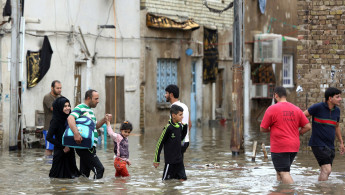58 Iraqis electrocuted during heavy rains
Fifty-eight Iraqis died of electrocution during heavy rains and flooding last week, the health ministry said on Thursday, illustrating the dangers posed by the country's dilapidated infrastructure.
The 58 "died of electric shocks," spokesman Ahmed al-Ridaini said.
The sewer system was overwhelmed by several days of heavy rain, leading to widespread flooding in Baghdad and other parts of the country, and with some areas still flooded days after the rain stopped.
| The electricity ministry issued a warning for citizens to be careful with the distribution networks, including wires, poles and transformers |
The flooding combined with decrepit electricity infrastructure to pose a deadly danger, and videos posted online showed the bodies of people purportedly electrocuted being fished out of flooded streets.
As more rain fell Thursday, the electricity ministry issued a warning for citizens to "be careful with the distribution networks, including wires, poles and transformers."
Because government-provided power falls far short of demand, many streets in Iraq are criss-crossed by spiderwebs of dozens of haphazardly strung wires linking homes and shops to private generators.
Government electricity provision - which falls to just a few hours a day during the summer, when temperatures top 50 degrees Celsius (122 Fahrenheit) - has been a major source of discontent in Iraq.
Anger over poor services and rampant corruption sparked weeks of protests earlier in the year. Reforms have been announced, but little in the way of significant change has occurred so far.
Iraq's once highly developed infrastructure was seriously damaged during the 1991 Gulf War and subsequent sanctions.
After the destruction of the 2003 US invasion of the country, attempts to rebuild the oil-rich country's infrastructure have been hindered by widespread violence and high levels of corruption.





 Follow the Middle East's top stories in English at The New Arab on Google News
Follow the Middle East's top stories in English at The New Arab on Google News


